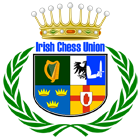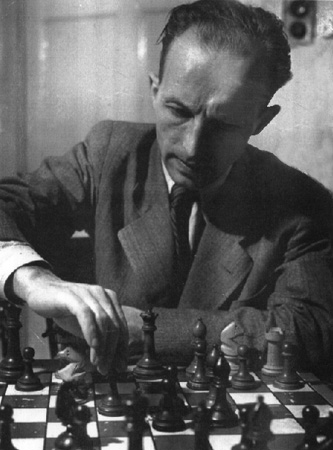Based on a letter from John, Michael's brother, in 1998.
Odessa File
Michael Schuster was born in Odessa on the Black Sea coast of Russia (now the Ukraine) in 1919. The country fell victim to a terrible famine in 1921 and the Schuster family moved to Bratislava (presently the capital of Slovakia) soon afterwards, where Michael learned to play chess at the age of 10. He soon acquired a pocket chess set which he carried around with him all the time. From the age of 15 onwards, he played chess at Reduta, a Slovak cafe, which hosted major chess championships and attracted grandmasters from Russia. Although Michael had left Odessa at an early age, the Russian influence lingered on and he always rated Alekhine and Tal as two of his favourite exponents of the game.
After four years in a commercial academy, Michael started work in an import/export business, later moving to Thonet, a furniture warehouse, which he managed until the end of the war.
Conscription Checkmated
Following the establishment of the new Czechoslovakian Republic in 1945, conscription to the army was introduced. At that time both Michael and his brother, John, were running their own machine tool import business (which was contributing towards the industrialisation of Slovakia). Michael was eligible for conscription and John - who was reluctant to lose his business skills - advised him to answer the call up late in the hope that the disorganisation which permeated the new army would enable Michael to avoid the draft.
Michael, accordingly, arrived ten days after the deadline and the recruiting officer called him into his office and berated him loudly for his late arrival. When the officer subsequenly discovered that Michael played chess, his attitude changed and they played several games which Michael contrived to lose. But he was unable to conceal his skillfullness as a player and the officer prevailed upon him to teach him the tricks of the trade. They played chess all that day and most of the next and the officer was both overwhelmed and delighted to discover the wide variety of openings and end games in Michael's repertoire.
When the time came for Michael to put in an appearance in the army barracks, the officer (who thought that Michael's skill as a chess player would be wasted as a conscript) diplomatically asked him whether he had any ailments such as flat feet, missing fingers or toes or rheumatism. Michael explained that he had hearing difficulties in his left ear and the officer arranged for him to visit the main military hospital where severe hearing-loss was diagnosed. Within a fortnight, he was released from his army duties. A case of chess conquers all?
Exodus from Czechoslovakia
In 1948 a putsch engineered by the Russian Soviets secured the inauguration of a Communist Government in Prague. At that time Michael was the owner of a company (known as Technos, Bratislava) which employed 35 individuals. On hearing of the new Government's plans to nationalise private enterprise, Michael decided to leave Bratislava and made his escape, with some friends, through Budapest in Hungary, via Vienna, to Zurich. In Zurich he met the former Czech ambassador to Ireland, Major Ruzicka, who suggested that Michael should use his engineering skills in Ireland, which was only just beginning to develop as an industrial base in the late 1940s. Michael travelled to Dublin via Amsterdam on the strength of a one year labour permit which Major Ruzicka had acquired for him.
His mother Klara and brothers, John and Lubo, joined him the following year after a dramatic flight from Czechoslovakia via Linz, the Alps and Antwerp. Soon afterwards, the Schuster brothers founded an engineering business in Cabra. Michael subsequently established Cromac, a company engaged in the importation of continental road machinery, in the mid 1950s.
Halcyon Days in Dublin
Cromac had its offices at 29 Clare Street, just opposite the Dublin Chess Club in Lincoln Place. For more than a decade, Michael played chess as a member of the Dublin Chess Club and won the Irish Championship in 1952.
He joined Collegians on its foundation in September 1963 and the club made history when it won the Armstrong Cup, Leinster's premier team trophy, the following year. The magnitude of their performance can be gauged from the fact that they won the trophy at their first attempt, a great fillip for chess in Leinster and a just reward for their ability and team spirit which was evident throughout the campaign. Michael's colleagues on the victorious team included Michael Littleton and Dick Grogan (a prodigy who represented Ireland in the 1956 Moscow when only 16 years of age).
Michael also won the City of Dublin Chess Championship (representing Collegians) in 1964, defeating P.Cassidy by 1½/½ in the final.
Final Years
Business concerns effectively precluded Michael from engaging in competitive chess in the 1980s. But he always kept a chess board in his Cromac offices and the intricacies of the game never lost their magic for him.
A.A.Milne once observed that it was impossible to win gracefully at chess: "No man has yet said 'Mate!' in a voice which failed to sound to his opponent bitter, boastful and malicious". Michael Schuster was one of several Irish chess champions who gave the lie to the above observation; his love of the game transcended all else. Win, lose or draw, it was the game itself (and not its spoils) which held him in its thrall.
Michael Schuster died on the 29th of October, 1989. He is survived by his wife Marie and children, Zuzka, Andrej, Sonia, Peter, Lida and Lara.

